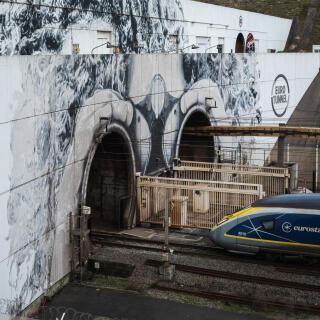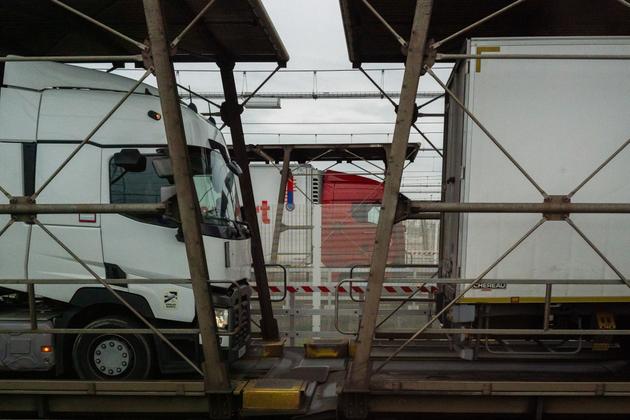


The Channel Tunnel's operator dreams of expanding into the rest of Europe
Long ReadBecause of Brexit and social dumping by ferry companies, the Channel Tunnel is gradually losing market shares. The operator, Getlink – whose workers went on strike on Thursday – has plans to develop rail connections with Cologne, Geneva and Marseille.
Jamie Foord and Matt Seagar have become unwilling specialists in customs forms. The two truckers know all about T1, T2, CMR and GMR, the names of various forms to be completed since Brexit (effective since January 1, 2021). And then there's the "manifest," a document that gives "a complete list of the products loaded in their semi-trailers – sometimes, the pile of papers is several centimeters thick," Foord said.
On Thursday, December 14, the two British truck drivers were sitting in the Channel Tunnel shuttle, returning to the UK after a delivery to Belgium for one and France for the other. On a screen, the trucks' number plates scrolled by, associated with an arrow: green for most, indicating that the formalities were in order and that the drivers could disembark without further checks, and orange for a few others, who would have to go through customs. "When we have a check, it usually takes just half an hour, but once it held me up for over four hours," said Foord.

Both voted for Brexit and still believe it was a good decision ("We wanted to reduce immigration," they said). To listen to them, border hassles seem rare enough as to not appear as a real problem.
Economic stagnation
If these kinds of difficulties are limited, it's largely thanks to the "smart border" implemented by Getlink, the company that operates the Channel Tunnel. Shortly after the vote in favor of Brexit, the company began discussions to dematerialize controls as much as possible. Since then, haulers have downloaded the forms in advance, which are processed by customs once the truck has boarded the train. In principle, everything is taken care of during the journey. "What we sell them is speed: It takes them 90 minutes from motorway to motorway," between the A16 at Calais and the M20 on the English side, explained Aude Bourdel, head of freight and customer relations at Getlink. This is the same duration as before Brexit.
Nevertheless, "around 20%" of trucks, according to her ("less than 10%" for Géraldine Périchon, Getlink's CFO) are checked by customs. "The time they spend there is not our responsibility," said Bourdel.
These glitches in the cross-Channel transport machine, along with the current economic stagnation, have been impacting traffic. In the first nine months of the year, 908,000 trucks passed through the Channel Tunnel. This is down 23% during the same period in 2019, the last comparable year before the Covid-19 pandemic (which started in 2020) and Brexit.

The problem is even more acute for Getlink as the tunnel is faced with social dumping from two of the three ferry companies that cross the Channel. In 2021, Irish Ferries entered the Calais-Dover route, adopting its usual practice of hiring seafarers under international maritime law conditions, far below the European minimum for social benefits. A year later, P&O Ferries copied this practice. They now bring in sailors from the other side of the world – the Philippines, Indonesia, India – and make them work four months in a row without a day off, for wages of around $2,000 a month (around €1,830).
You have 70% of this article left to read. The rest is for subscribers only.
